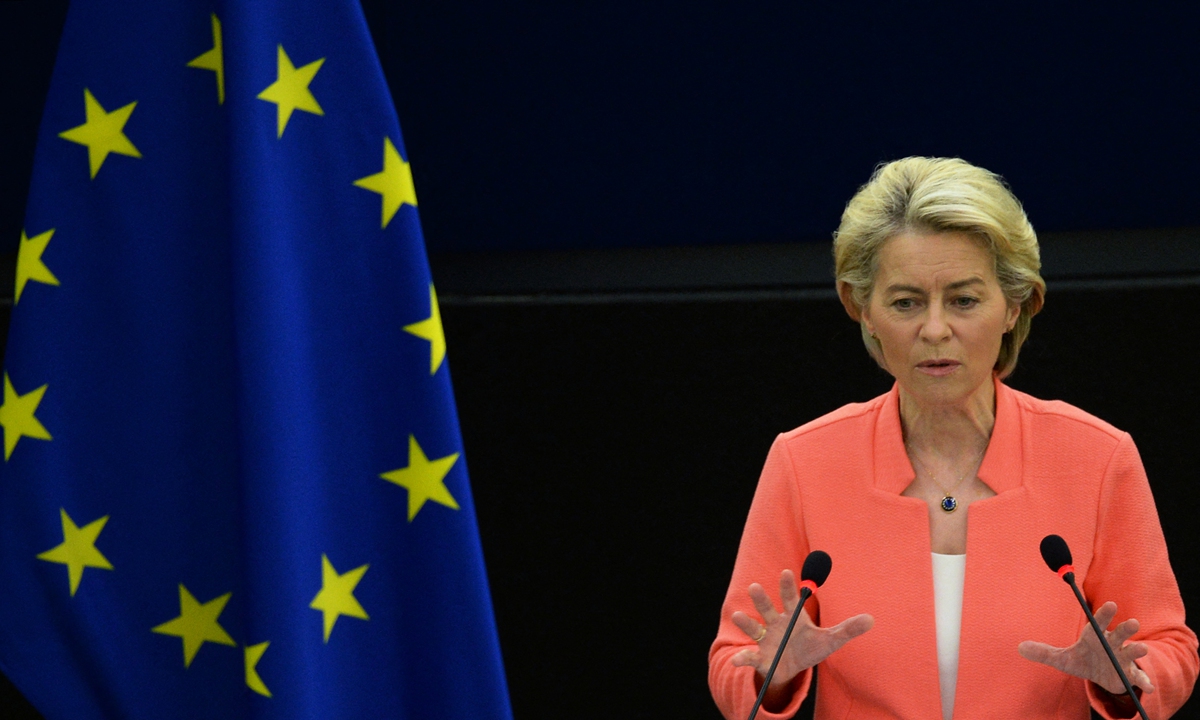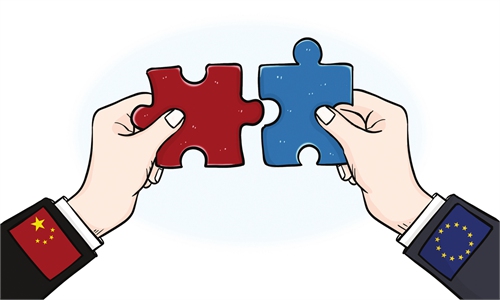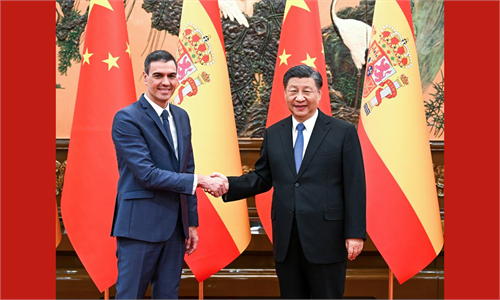
European Commission President Ursula von der Leyen. Photo: AFP
The EU's unified foreign policy is facing a significant choice, not concerning Europe-Russia relations, but Europe-China relations.The recent successive visits of the EU and the bloc's member states' leaders to China show the EU's intention to distance itself from the US containment strategy toward China. However, in a speech on March 30, European Commission President Ursula von der Leyen made a speech on China-EU relations, saying the EU does not want to "decouple" China but needs to balance its relationship with China and focus on "de-risking," which means reducing the risks of the EU's relations with and dependence on China.
According to von der Leyen, Europe does not want to cut economic, societal, political or scientific ties with China. Still, the relationship between Europe and China currently needs to be balanced. Therefore, the EU needs to rebalance this relationship based on transparency, predictability, and reciprocity.
Our understanding is that the balance Von der Leyen refers to involves weakening relations with China, making it difficult to achieve balance and making the EU follow the US strategy toward China even more.
Since the outbreak of the crisis in Ukraine, the EU has firmly chosen to support Ukraine's policy of resisting Russia, which clearly defined the EU's policy toward Russia. And the result of this policy is to be more closely tied to the US, including when making choices in relations with China.
The EU is not willing to choose sides between China and the US. As one of the most crucial global poles, the EU has been trying hard to enable itself to keep an appropriate distance from the US and China politically and economically. However, it has sometimes had to move closer to the US.
The trouble now is that due to the reorientation of the US strategy toward China, which sees China as a major competitor and "disruptor" of the US-led order, Washington is constantly leading and forcing the EU to follow its strategy and adjust accordingly.
It is undeniable that the EU is easily influenced by the US in its China policy due to its ideological similarity and military alliance. The crisis in Ukraine has increased the EU's strategic dependence on the US.
One of the main goals of European integration that have begun since World War II has been to create a stable, cooperative, and securely indivisible new Europe. However, there are now three challenges to European integration, one of which is the need for the EU to not only integrate different nation-states together so that these countries have less of a sense of their own national identity and more of a great European identity.
Another challenge is that globalization has made China rise as an important pole in the world, and Europe faces the question of maintaining its independence between China and the US. This leads to the third challenge: the relationship with the US. Undeniably, the rise of the EU and the euro cannot be harmonious for the US. How the EU can defend its interests in the circle of allies without making itself a complete follower of the US is not an easy task.
EU leaders have obviously realized that the EU's policy toward China should be different from that of the US, and it should not engage in full-scale "confrontation plus decoupling" with China as the US has. Still, they have yet to find a practical middle way, although being caught in the middle feels uncomfortable.
The EU's so-called "de-risk" is not a pragmatic approach to Europe-China relations in line with the EU's interests, but an ideological position and a mentality to guard against China. The result will make the EU's policy more consistent with the US, and eventually, it will be "circled" by the US in its bloc or sphere of influence.
In fact, keeping the EU's relations with China at a certain distance from those of the US is relatively easy. The EU should first be pragmatic, value cooperation more and measure it by its own interests, not by ideology or the demands of other big powers. With such an attitude toward its decision-making, issues such as the China-EU Comprehensive Investment Agreement (CAI), which is being currently "frozen" at the European Parliament, will not be a problem.
Of course, the EU will not alienate its alliance with the US because of its relations with China, but it is easy for the EU to damage its relations with China to preserve the US alliance. The result will not be a balance but an imbalance. This imbalance will undermine the EU's role in the international arena and ultimately weaken the EU's efforts to become a significant global pole.


